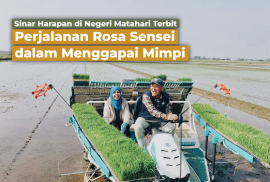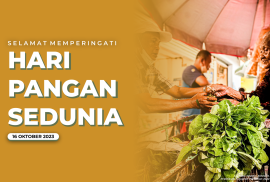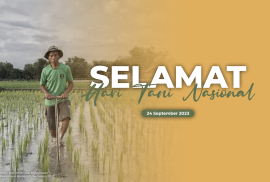Rosalia Natalia Seleky, Ph.D., commonly called Rosa Sensei, is an alumna of the Department of Agricultural Socioeconomics, Gadjah Mada University, class of 2011. Her study struggle has led her to explore the world of education until she is now an Assistant Professor (Young Lecturer) at Shimane University, Japan. From the start, Rosa showed interest in the socio-economic field. Still, because she had a background in Mathematics and Natural Sciences in high school, Rosa finally looked for a major in the Science and Technology group that suited her interests. This led him to embark on an academic journey in the Department of Agribusiness, Faculty of Agriculture, Gadjah Mada University, which ultimately opened the way to exploring knowledge in different parts of the world.
ARTICLE
The recent increase in rice prices in several regions in Indonesia has raised concerns among the public. To gain a deeper understanding of this phenomenon, we interviewed Prof. Subejo, S.P., M.Sc., Ph.D., a Professor in the field of Agricultural Extension and Communication from the Department of Agricultural Socioeconomics, Faculty of Agriculture, Gadjah Mada University.
In this interview, Prof. Subejo said that several factors caused the increase in rice prices, as well as their impact on the socio-economic conditions of farmers and society in general.
The agricultural sector plays an important role in World Food Day. Farmers and food producers are the main actors who work hard every day to provide food for every human being. For this reason, sustainable agricultural methods and support for small farmers are needed to ensure that everyone has access to sufficient and nutritious food. Indonesia itself has a close relationship with the celebration of Food Day. As an agricultural country, Indonesia is one of the largest food producers in the world. Superior products such as rice, coffee, and palm oil are a source of life for millions of farmers in this country. World Food Day is an opportunity for Indonesia to celebrate the success of the agricultural sector and highlight the challenges such as climate change, price stability, availability of capital, farmer welfare, and other factors that can influence food production.
In celebrating World Food Day, great hope lies in sustainable agricultural development. This includes investment in modern agricultural technology, coaching and mentoring farmers and promoting local food to support economic growth. Public awareness about the importance of reducing food waste and practicing sustainable consumption patterns is also crucial.
World Food Day is not only about understanding the important role of farmers in providing food for the world but also about reflecting on how each individual can contribute to creating a more sustainable future. By supporting farmers, understanding the origins of food, and reducing waste, we can help create a world where everyone can access sufficient, nutritious food. Therefore, let’s build a better future together through sustainable agriculture.
One of our greatest hopes is agricultural modernization. With increasingly advanced technology, agriculture in Indonesia must continue to innovate and adopt more efficient and sustainable agricultural methods. This includes information technology, proper fertilization, wise water management, and crop diversification. This modernization will help farmers increase their productivity and reduce crop losses.
Additionally, sustainability is crucial to the future of Indonesian agriculture. Communities, farmers, and policymakers must keep land, water, and other natural resources fertile and well-maintained. Sustainable agricultural practices, such as organic farming and organic fertilizers, should be widely supported and implemented. This will help protect the environment, reduce the impact of climate change, and ensure that Indonesian agriculture can continue to thrive in the long term.
Education and training is another essential thing. Relevant parties must always support farmers to increase their knowledge and skills in agriculture management. Training programs on best agricultural practices and modern technology will help farmers become more independent and productive. Additionally, a firm and fair market is also essential. Building efficient distribution systems and connecting farmers with broader markets will help increase farmers’ incomes and ensure that their crops can be sold at fair prices.
National Farmers’ Day is an excellent time to reflect on these hopes. Let’s support Indonesian agriculture by providing the attention, resources, and support it needs to reach its extraordinary potential. With modernization, sustainability, education, and strong markets, we can ensure that the future of Indonesian agriculture will be bright, sustainable, and highly competitive globally. May Indonesia continue to be successful in the agricultural sector, and our farmers achieve the success they deserve. Happy National Farmers Day!




